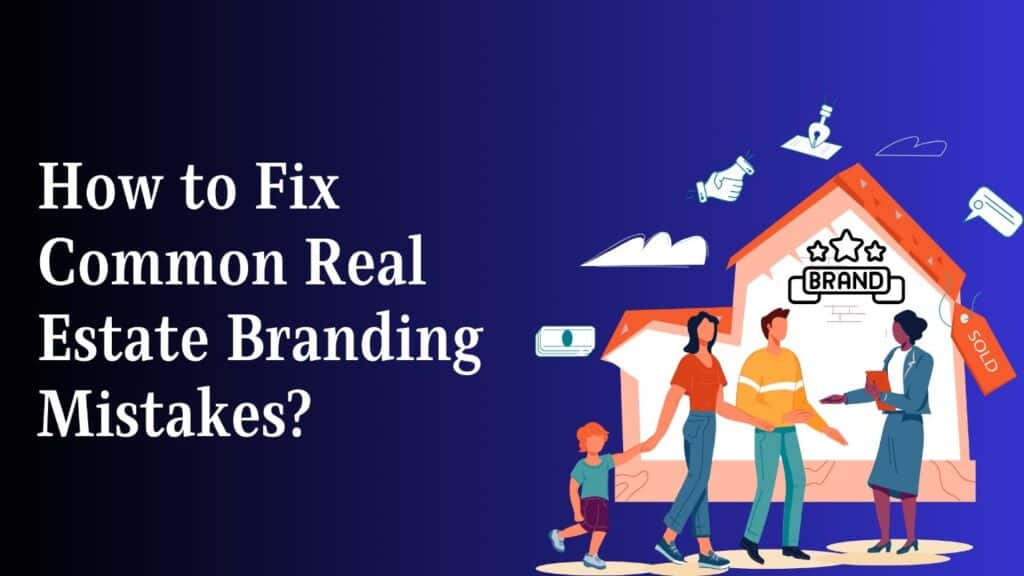
Common Real Estate Branding Mistakes
Building a brand that people trust and remember is more vital for success in the competitive real estate market than just generating sales. Nonetheless, creating an effective branding strategy is not always easy, and many agents unknowingly commit mistakes that reduce their brand’s visibility. Whether it’s a poor online presence or an inconsistent message, these errors can lose you significant leads and reputation.
In this post, we will look at typical real estate branding issues and offer effective solutions to help you create an appealing brand identity.
What is Real Estate Branding?
Real estate branding is all about creating a unique identity that helps you stand out and connect with people in a competitive market. In fact, Statista reports that the global real estate market is expected to reach US$654.40 trillion by 2025. This growth makes it even more important to establish a unique and memorable brand to attract clients.
The goal of branding is to build trust, credibility, and long-lasting customer connections. It goes beyond simple visual components like logos or catchy phrases. An effective brand ensures you’re recognized, remembered, and preferred when potential clients are ready to make real estate decisions.
Your brand should be an accurate representation of your fundamental beliefs, professional identity, and unique approach to assisting customers in meeting their real estate needs. Everything from your communication and self-presentation style to your website and social media presence is included. A well-designed digital branding solution positions you as the go-to expert when someone is ready to purchase or sell a house, making you recognizable and approachable.
Key Elements of Real Estate Branding
Brand Identity:
This includes your visual elements, including logo design, color palette, typography choices, and overall styles that define your business.
Brand Message:
Your core purpose, principles, and unique selling points (USP) explain why clients should choose you.
Online Presence:
A comprehensive digital presence contains a professional website, active social media channels, and optimized content for visibility. Collaborate with a reliable digital marketing company for expert guidance and optimal results.
Customer Experience:
How you interact with clients, from first contact to closing deals and beyond.
Personal Branding:
To establish trust and confidence, highlight professional accomplishments, client success stories, and unique capabilities.
Storytelling:
To engage emotionally with your audience, provide interesting storytelling, customer stories, and industry insights.
Why is Real Estate Branding Important?
Builds Trust & Credibility:
A well-executed digital branding solution creates confidence and professional authority in the minds of potential clients.
Makes You Memorable:
Consistent brand presence across all platforms ensures that clients remember you when they need a real estate expert.
Helps You Stand Out:
The real estate market is crowded, and a unique brand strategy sets you apart from the competition.
Strengthens Your Online Presence:
An optimized brand website and social media marketing make it easier for potential clients to find and connect with you.
Builds Loyalty:
People prefer working with familiar and trustworthy brands, leading to repeat business and referrals.
Makes Marketing More Effective:
A clear and consistent digital branding solution makes your ads, posts, and promotions more impactful.
Common Mistakes in Real Estate Branding and How to Fix Them
- Lack of a Clear Brand Identity
Without a well-defined idea of your professional identity and core principles, your brand message becomes diluted and ineffective. This ambiguity makes it challenging for prospective clients to recognize your unique value proposition.
Fixes:
- Define your core values and what sets you apart.
- Develop a unified visual presence, incorporating consistent logo design, color schemes, and brand voice.
- Demonstrate your industry expertise, dependability, and specific advantages through a cohesive brand marketing strategy.
- Forgetting the Power of Storytelling
Real estate is about much more than just properties. It encompasses aspirations, sentiments, and life-changing moments. Neglecting narrative elements can depict your brand as impersonal and disconnected.
Fixes:
- Talk about the emotional process of choosing a house by sharing unique stories of customers you have assisted.
- Use engaging narratives in all of your marketing materials, including blog posts and social media marketing.
- Humanize your brand by focusing on the connections you create, not just the deals you close.
- Setting Unrealistic Expectations (Overpromising)
Making commitments beyond your capacity to deliver undermines client trust and damages professional credibility.
Fixes:
- Set realistic expectations by being transparent about what clients can expect throughout the process.
- Address potential challenges proactively while explaining your problem-solving approach.
- Aim to under-promise and over-deliver, ensuring that you exceed client expectations.
- Focusing Solely on Properties, Not Your Brand
Limiting marketing efforts to property listings overlooks the opportunity to showcase your unique service experience.
Fixes:
- Emphasize your client relationships and your comprehensive service approach.
- Demonstrate your value by providing exceptional service through personalized attention, expertise, or market knowledge.
- Center your brand message on reliability, trust, and client satisfaction.
- Neglecting Digital Marketing and Social Media
Overlooking digital platforms in today’s connected world significantly limits your reach and engagement potential.
Fixes:
- Build a consistent social media marketing plan for publishing consistently on networks like Instagram, Facebook, and LinkedIn.
- Create useful articles on industry insights, home-buying tips, and client testimonials.
- Foster community engagement by responding to comments, questions, and direct messages to build a meaningful connection.
- Not Engaging with Clients After the Sale
Once the deal is closed, many agents stop communicating with clients. This reduces the opportunities for referrals and repeat business.
Fixes:
- Maintain ongoing relationships through regular communication and meaningful follow-ups.
- Share valuable post-sale resources, including property maintenance guidelines and updates about local community events.
- Create a systematic referral program that compensates customers for suggesting your services to their friends and family.
- Inconsistent branding across platforms
A scattered brand presence across different channels (website, social platforms, email) causes uncertainty and undermines your professional reputation.
Fixes:
- Create comprehensive brand guidelines specifying color palettes, logo usage, typography, and tone of voice.
- Implement uniform branding elements across all touchpoints—from your website and social media to business cards and emails.
- Conduct periodic brand audits to maintain consistency and relevance.
- Trying to Handle Branding Alone
Managing your brand identity independently without professional guidance often results in inconsistent presentation and mixed messaging.
Fixes:
- Partner with an experienced digital marketing company to develop and execute a robust branding strategy.
- Leverage professional expertise for crucial elements like visual identity development and message crafting.
- Consider professional support as a strategic investment in your long-term success.
- Targeting the Wrong Audience
Attempting to appeal to all market segments typically results in generic messaging that fails to resonate with potential clients.
Fixes:
- Consider factors like location, income, and age when creating your ideal customer profile.
- Customize your messaging to appeal to your target demographic, whether they are first-time homebuyers, investors, or premium purchasers.
- Create comprehensive buyer personas to improve the effectiveness of your marketing initiatives.
- Overlooking the Importance of Local SEO
Neglecting local SEO can significantly impact your visibility among potential clients in your service area.
Fixes:
- Maximize your Google Business Profile and encourage clients to leave reviews.
- Incorporate location-specific keywords throughout your digital content.
- Develop area-specific resources like community guides and market analysis reports.
- Failing to Adapt to Market Changes
If you do not keep up with shifting market conditions and technological advancements, your brand may appear irrelevant and out of date.
Fixes:
- Stay updated on industry developments, such as sustainable practices and digital innovations.
- Regularly refresh your marketing approach to reflect contemporary preferences.
- Evolve your brand to address changing client priorities, from virtual property tours to eco-friendly solutions.
Conclusion
To wrap up, fixing common real estate branding mistakes requires a strategic approach that focuses on understanding your target market. It’s not just about having a polished logo or catchy slogan – it’s about being consistent, authentic, and clear in every message you send out. Every detail counts when it comes to optimizing your photos, modernizing your website, or improving local SEO. Avoiding these typical errors can help position your real estate brand for long-term success and development.
Ready to elevate your real estate brand? Contact us today to get started!







